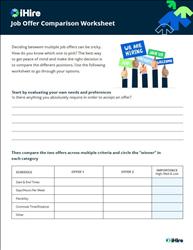- Job Seeker Resources
- |
- Last Updated: October 16, 2023

Dealing With Multiple Job Offers [Worksheet]
Take a deep breath and pat yourself on the back for your clearly impressive interview skills. Then use these tools to get down to business.
It can be tricky when more than one hiring manager gets serious about your future at their company. Should you tell them about each other? How do you handle offers that come at different times? And how do you know which position to take?
Take a deep breath and pat yourself on the back for your clearly impressive interview skills. Then use these tools to get down to business.
Comparison
Whether you have one job offer and expect to get another soon or you already have multiple in hand, your first step is to compare the different positions.
To consider the pros and cons of your various options, you need to know three things: what you want, how important each desired factor is, and what each company will provide. Start by evaluating your own needs and preferences. What situation would be ideal? Is there anything you absolutely require in order to accept an offer? Some areas you might consider include:
|
Schedule
The Work
The Workplace
|
Benefits & Compensation
Your Future
Relocation (if applicable)
|
Next, weigh offers across the categories you ranked important. You can use a templated chart like the one we've provided, or create your own table tailored to your preferences. If you’re having trouble making the hard decisions about what matters most, or whether two less-important perks make up for the lack of a more valued benefit, talk to someone you trust. A fresh perspective may be just what you need.

Timing
Now, if this analysis makes deciding between positions easy, and you have the winning offer already in writing, that’s great. Many people, however, will be in a situation like this one:
You’ve been talking with Company A for a while, and they seem quite interested in you. While you would be alright at Company A, you’re really excited about the opportunities at Company B. Then Company A sends you an offer, giving you 48 hours to respond. That’s great, except you have your second interview with Company B at the end of the week. Even though you think you’ll get an offer there, it isn’t guaranteed.
So what now?
You need to figure out your timetable. Ask the hiring manager from Company A for an extension (be cautious requesting anything more than a week). Be honest; tell them you’re excited about the offer, but you have another interview with a different organization at the end of the week and you’d like to see it through. When you go to your interview with Company B, tell the hiring manager that they are your first choice, but you’ve received another offer you need to respond to. Ask how long it should take to know whether you will get the position.
A few key points about juggling potential employers:
- Keep it professional: Be polite, sincere, and respectful. You don’t want to burn any bridges.
- Avoid details: You can mention salary ranges, for example, but don’t go into the minutiae of who has offered what. It’s unnecessary and is seen as unprofessional.
- Watch out for negative attitudes: If an employer or manager becomes angry or dismissive, it may be an indicator of how they regularly interact with their staff.
Want More Career Guidance?
Get resources for every phase of your job search: resume writing, interviewing, salary negotiation, and beyond!

Sign in with social:
We Value Your Privacy
Negotiation
As with any job offer, you may choose to negotiate once the proposal is extended. However, it is easy to go too far when multiple businesses are vying for your talent. Be realistic about your bargaining power and don’t let the excitement of multiple offers go to your head. Here are three tips for an effective compromise:
- Research: Use iHire's Salary Research Tool to determine the average wage for the position. A quick Google search may also be useful. Don’t ask for anything massively outside the norm; you will scare potential employers away.
- Don’t try to pit companies against each other: If you go back and forth between organizations asking them to match each other on benefits, salaries, etc., hiring managers will become frustrated and simply hire someone else.
- Use your chart: Make sure that whatever you’re asking for ranked highly for importance in the comparison analysis from the beginning of this article. There are plenty of horror stories about people who based their decisions on something they didn’t consider vital—don’t become one of them!

Reputation
Hiring managers talk and network, so ruining your image at one company may have far greater implications than you realize. Job seekers who annoy future employers by playing them against each other, for example, may develop a reputation as not worth the time, energy, or cost of consideration.
But the absolute surest way to damage your future prospects is to accept an offer… and then decline. There are people who recommend this, who claim it’s “just business,” and that hiring managers have no reason to be offended if you accept one position and then decline it before you start so that you can take another.
This simply isn’t the case. The company puts time, effort, and money into preparing for your arrival once you commit to your new role. They contact all the other candidates they were considering to say the position has been filled and take down their job postings. If a hiring manager has to go through the time and cost to restart the candidate search because you didn’t stick to your agreement, you can be sure s/he will warn others not to risk hiring you in the future.
With some careful navigating, you can easily manage multiple job offers and land the job you want. Just remember what is most important to you, and make that the focus of your search.
Looking for more in-depth advice? Enroll in our Salary Negotiation Masterclass!
Sign In or Register to access all articles and insider tips for help in your job search.
Search for Human Resources Jobs
RELATED JOBS
Screen reader users may encounter difficulty with this site. For assistance with applying,...
Human Resources Coordinator - $5,000 Hiring BonusHuman Resources Coordinator Ohio Branch 8320 Global Way SW, Etna, OH 43018 New hires earn a...
Bilingual RecruiterJob Description: As a Bilingual Recruiter, you are part of a team of highly skilled recruiting...
Staffing Coordinator/Scheduler - Inpatient RehabOverview OhioHealth Rehabilitation Hospital *A joint venture with Select Medical & OhioHealth*...
Training Coordinator Time & Attendance ModernizationTraining Coordinator - Time & Attendance Modernization Location: Remote (with occasional travel...
RELATED RESOURCES
Find the Right Job Faster
- Get personalized job matches sent to your inbox every day
- Connect directly with employers before your competition
- Advance your career with expert advice on interviewing, salary negotiation, and more
We value your privacy





